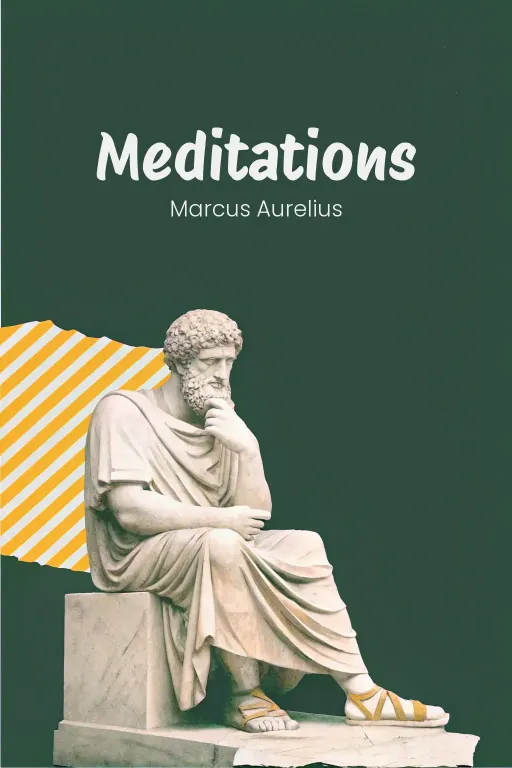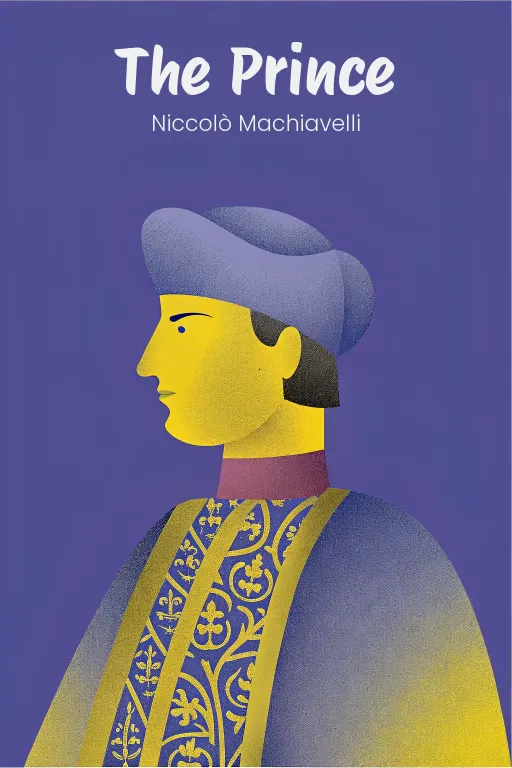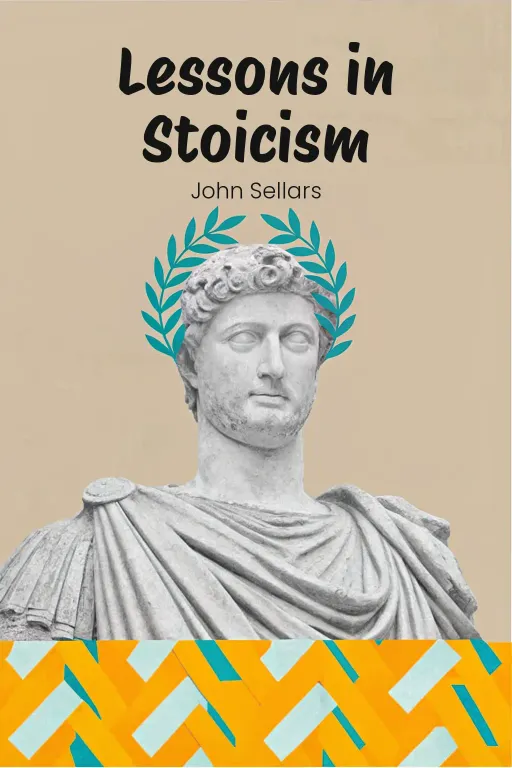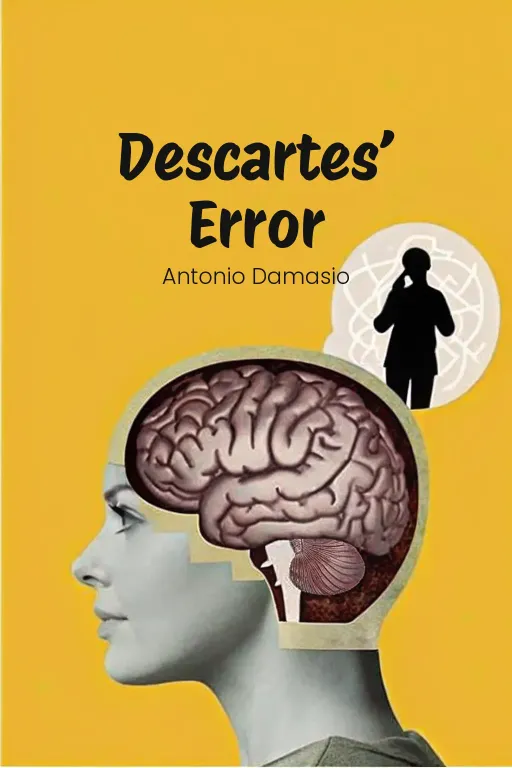
Meditations
Philosophy
Marcus Aurelius
An Exegesis of "Meditations": A Stoic Emperor's Guide to the Inner Self
Marcus Aurelius's "Meditations," far from being mere historical artifact, constitutes a profound and enduring exploration of Stoic philosophy articulated through intensely personal reflections. Penned not as a formal treatise but as a private journal, the text delves into the fundamental principles of Stoicism, offering a pathway toward virtue, acceptance, and inner peace. Aurelius grapples with the nature of existence, the inevitability of mortality, the imperative of rational thought, and the interconnectedness of humanity, offering readers a timeless guide to cultivating a life of profound meaning and equanimity. The enduring resonance of "Meditations" resides in its ability to transcend temporal boundaries, providing solace and direction for individuals navigating the complexities of the human condition across centuries.
A Noble Foundation: Contextualizing Marcus Aurelius
Marcus Aurelius Antoninus emerges not merely as a Roman Emperor but as a philosopher-king, a rare confluence of power and wisdom. Born into privilege in A.D. 121, his ancestry traced back to the revered Numa, Rome's second king, known for his piety, Aurelius was steeped in a tradition of leadership and civic responsibility. However, his path to Stoic sage was not paved solely with privilege. The early loss of his parents instilled a profound appreciation for familial bonds and the enduring values they imparted. Adopted by his grandfather, Annius Verus, Aurelius was nurtured in an environment that prized gentleness, humility, and the fortitude of personal virtue amidst adversity. This formative influence is palpable throughout "Meditations," where Aurelius frequently acknowledges the debt he owes to those who instilled in him the foundations of a virtuous life.
The philosophical milieu of his upbringing further sculpted Aurelius's character. Under the tutelage of distinguished mentors such as Rusticus and Sextus, he imbibed the core tenets of Stoicism: self-improvement, sincerity, and adherence to nature's immutable laws. These mentors instilled a belief in virtue as the supreme good, advocating for a life that mirrored the moral excellence he observed in others. These formative lessons became the bedrock of Aurelius's worldview, deeply influencing his writings, particularly his reflections on Stoicism. In "Meditations," Aurelius struggles against the decadent excesses that characterized his era, distancing himself from the superficial allure of spectacles like chariot races and focusing instead on duty and integrity. This inclination toward simplicity pervades his writing, a testament to his dedication to self-accountability and character refinement. He confronted both external threats and internal strife with unwavering adherence to Stoic principles, demonstrating that a philosophical leader could effectively strategize military campaigns and administer justice with equanimity.
Thus, Marcus Aurelius becomes an exemplar of the Stoic ideal, embodying inner tranquility amidst chaos and prioritizing virtue above all external circumstances. His journey exemplifies the transformative power of influential relationships and philosophical guidance, underscoring their profound impact not only on individual lives but also on the fate of nations.
Core Stoic Tenets: A Deep Dive into "Meditations"
I. The Architecture of Gratitude and Personal Growth
Aurelius's reflections are frequently punctuated by expressions of gratitude, recognizing the virtues he acquired from his progenitors, mentors, and the capriciousness of Fortune. He acknowledges the influence of moderation, truthfulness, and cheerfulness in shaping his character. These virtues arose not spontaneously but through the deliberate cultivation of role models and mentors. His grandfather's lessons in gentleness and restraint manifest in Aurelius's own contemplations on maintaining composure amidst public life's storms.
Aurelius writes, “Whensoever thou wilt rejoice thyself, think and meditate upon those good parts and especial gifts, which thou hast observed in any of them,” thus proposing that observing virtue in others can ignite virtue within ourselves. This sentiment transcends individual self-improvement, suggesting a communal framework for growth achieved by recognizing and appreciating the inherent goodness that surrounds us. Aurelius recognizes the unpredictable currents of life, attributing much of his fortune to divine providence and the whims of fate. He contemplates the duality of existence, acknowledging that fortune favors some while challenging others, presenting opportunities for reflection, learning, and adaptation. He urges himself, and, by extension, his readers, to remain grounded despite the vicissitudes of fortune: “Let these things suffice thee; let them be always unto thee, as thy general rules and precepts.”
Through his expressions of gratitude, Aurelius not only reveals his personal philosophy but also offers a path toward cultivating deeper self-awareness and resilience. He demonstrates that by honoring those who shaped us and recognizing the role of fortune in our lives, we can forge a more meaningful existence, rooted in humility and guided by virtue.
II. The Ephemeral Nature of Existence and Mortality
A cornerstone of Aurelius's philosophy is the recognition of life's inherent transience, a truth often obscured in the daily pursuit of ephemeral goals. He encourages confrontation with the reality that the perceived world is transient: “This world is mere change, and this life, opinion." This assertion encourages profound introspection about our individual significance within the grand tapestry of existence.
Aurelius advocates for embracing the cyclical nature of fate and the universe as a means to achieve inner peace. He presents each change in life – sickness, joy, failure, triumph – as purposeful, reflecting the divine orchestration underpinning existence. Distorted perceptions can obstruct our understanding of truth, he argues. “If to understand and to be reasonable be common unto all men, then is that reason… common unto all.” This shared rationality underpins the argument for embracing our roles within community and the world, fostering unity rather than isolation. By contemplating the significance of worldly matters, Aurelius suggests, one can grasp the enduring value of virtue, an intrinsic goodness that transcends the fleeting nature of fame and possessions. This realization compels a focus on ethical principles over superficial accolades. “What is it then that shall always be remembered? All is vanity.” He implores us to prioritize just actions, truthful words, and acts of kindness.
Mortality teaches resilience and acceptance. Aurelius contends that life's tribulations and the inevitability of death are natural occurrences, integral to human journeys rather than misfortunes. “…remember this, that within a very little while, both thou and the individual you observe shall be dead…” Such reminders urge cherishing each moment and leading a life imbued with purpose, leaving a legacy defined by moral integrity rather than material wealth. Fully experiencing life in the present allows for deriving peace from understanding our place within a greater whole. “The very nature of the universe delights in nothing more than in altering those things that are.” Aurelius recognizes that destinies are intertwined within the diverse fabric of existence. By embracing mortality and interconnectedness, we cultivate serenity, fueling virtuous lives that yield lasting significance beyond ephemeral concerns.
Aurelius urges a shift from worldly anxieties to the tranquility derived from understanding our place in the universe. Recognizing that “whatsoever doth happen in the world, doth happen justly,” he encourages awareness of aligning actions with goodness. Meaning is found not in resisting fate but in harmonizing with the natural order, leading lives that embody virtue, kindness, and service.
III. Rationality and Ethical Virtue
Aurelius posits virtue as a multifaceted concept, composed of justice, self-control, and charity, all governed by reason. Virtue requires a commitment to rational thought and deep understanding of the natural order of existence, demanding unwavering fairness, disciplined minds, and selfless action. This perspective promotes action outside self-centered societal expectations. Rationality serves as the guiding principle in complex decision-making, allowing individuals to mediate desires and challenges, assessing impulses, and distinguishing between beneficial and attractive but ultimately detrimental options. This approach demands contemplating the longer-term impacts of choices, aligning impulses with values and communal well-being.
Aurelius advocates aligning actions with nature, advocating resistance against potentially misdirective social and external pressures. Turning inward to the inner self reflecting authenticity becomes imperative, reminding us of a shared humanity. He suggests engaging with historical figures and philosophers who championed rational thought and ethical harmony, reinforcing that righteousness is a collective journey: what is endured for virtue is a testament to character. The focus of rationality and virtue should not solely be on personal gain but on understanding a place within a broader life that contributes to communal beneficence.
IV. Interconnectedness and Mutual Responsibility
Human interconnectedness is woven through mutual support and a commitment to the common good, emphasizing individual impact upon others. The interconnection of human lives underscores the recognition that each action reverberates through societies, as individual decisions influence families, communities and the world at large. From a philosophical point of view, individual interconnectedness is more than a social obligation, morphing into a moral imperative. Good citizenship originates through understanding this connection, promoting cooperation, solidarity, and kindness across the spectrum of human existence. A moral obligation to act with compassion, tolerance, and justice cultivates a sense of accountability. Each person must uphold values that nurture society. Seemingly small acts of kindness can ignite subsequent altruistic actions.
Unity and harmony are promoted, grounded in the belief that virtuous action yields collective impact. Qualities reflecting empathy, patience, and mutual understanding shape a landscape wherein differences transform into opportunities rather than obstacles. Embracing diversity enhances the human experience, reflecting recognition of the interdependence when thriving collectively moves toward greater good. To foster such a society requires these principles be instilled during the everyday, contributing to an overarching narrative in human life. Therefore, interconnection should be embraced not as a concept but a reality, shaping engagement in interactions and contributing to community construction. Shared virtue fosters resilience, understanding, and unity amongst all.
V. The Art of Emotional Regulation and Perspective
Maintaining inner equilibrium requires mastering emotional regulation and perspective, as Aurelius underscores how self-control, particularly over emotions such as anger and discontent, is not just advisable but necessary. He acknowledges anger's capacity to darken reasoning, resulting in regrettable decisions, challenging us to recognize feelings as transient and avoid fostering anger. Self-worth cannot be measured via ephemeral validation.
A stable mind cultivates truer tranquility through avoiding external chaos. Focusing on an internal state transcends day-to-day turbulence. In contemplating a larger view, external disorder can be addressed with equanimity. Challenges should be accepted as a part of natural order, ultimately allowing for composition through turbulent storms. The act of managing emotion nurtures fortitude, assisting in navigating complexities. The pursuit of life ultimately yields equanimity and resilience, granting strength during adversity.
VI. Philosophy's Crucial Role
Aurelius positions philosophy as a vital cognitive tool, directing individuals through difficult decisions and moral choices, fostering virtue. Like a star for navigation, philosophical insight encourages reflection. Historical analysis with figures such as Socrates emphasize similar points from antiquity: embracing inquiry and cultivating virtue is important to one's character. Self-reflection combined with introspection ultimately maintains moral alignment. Intentions aligned with ethics is achieved through recognizing the universes inherent order.
Committing to kindness, Aurelius expresses seeing others through a moral and ethical kinship. Challenges often transpire via perspective—rather than the external situation. Acceptance of broader shared humanity fosters kindness instead of anger. Consequently, philosophy's influence on personal ethics enhances personal integrity through inward reflection and connection to others.
VII. Impermanence and the Courage to Adapt
Trials should be embraced, and change should be accepted as a positive catalyst for growth throughout life. Resilience is key during this process and requires profound shifting of perspective. Ancient Stoics have acknowledged that "this world is mere change, and this life, opinion," reinforcing the nature of transformation. Agency limitations are a part of life during its various phases. Balance must be found with turbulence. Unshackled judgements can be made that empower challenges. Reframing perception not only fortifies one's resolve but fosters compassionate connection.
Focus must transform away from loss and toward growth: reflections encourage a potential to redefine and reinterpret. The importance of resilience comes from wisdom via mortality and global cycling. Struggle cultivates strength to surpass human chaos and lead with fortitude.
VIII. Facing Finite Existence
Life's brevity inspires one to promote virtue above material success. Finite existence promotes intention. Death should inspire action: a return to the universal order. Each existence is not a tragedy, rather boundaried as a process. Kindness and sociability during existence, as Aurelius details, highlights the interplay between connection/existence. Finite acknowledgement via wisdom emphasizes not what is gained, but one's character. In short, transcending anxiety involves acts of kindness; Aurelius reiterates this sentiment when highlighting the importance of virtue in living one's shared human experience. Ultimately it enables purpose within the life cycle.
Learning from the Stoics: Aurelius's Education Exemplified
I. Profound Influence of Philosophy
Stoicism has shaped behaviors and deep understanding, emphasizing self-discipline and virtue. Figures such as Epictetus emphasized that focusing on behaviors provides agency when facing trials. Homer used narratives to mediate this virtue via the "Iliad", where characters grappled with fate versus choices. Balancing will highlights the importance of virtue that continues to provide self reflection. Contemporary Stoic context reinforces integrity to find wisdom in our era. Philosophers of antiquity open dialogue where virtue translates to modernity and continuously adapts resilience.
II. Dialogue of the Wise: Aurelius and Fronto
The bond between Aurelius and Fronto is more than teacher and student. Their letters highlight how to embody Stoicism, especially as Marcus states through imploring what needs to be ethical—a common trait of Stoic focus. Critique from Fronto encouraged Aurelius to integrate virtue within his decisions. Encouragement that Fronto promoted taught Aurelius to promote truth. Their interactions promoted self-reflection and personal growth. Emotions and direct communication built upon mentorship despite serious philosophy. Bonds highlight the power of connection during the Stoic process.
Conclusion: The Stoic Life as a Call to Virtue
Living aligns with universal action. Harmony inspires nature, acting based upon principle. Marcus states "all things happen according to the nature of the universe," highlighting an importance of acceptance to find integral composure within disruptions. The backbone of Stoicism emphasizes moral principles wherein virtue can translate strength, not based upon validation. Action should reflect values independent of validation. Mindfulness and balance emphasize asking "how will this action impact well-being" creating reflection while minimizing the weight from social stress. Teaching remains for modernity to foster community via shared experiences. Interconnectivity ensures that one should create world interactions that emphasizes the respect between members. Virtues promote genuine expression emphasizing that as humans we are interconnected in an ever-evolving world.









